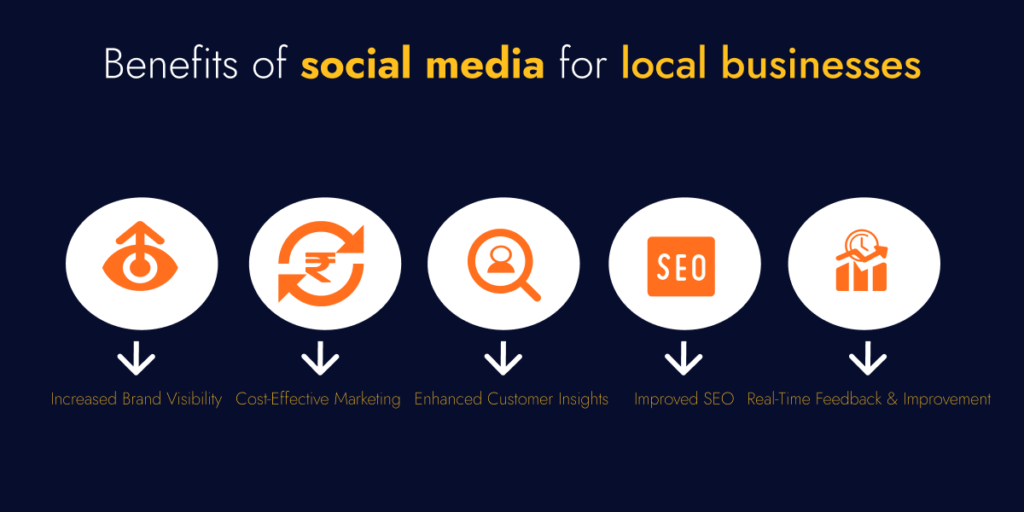In today’s digital age, social media for local businesses has become an indispensable tool for reaching and engaging with customers. Social media platforms provide a unique opportunity for businesses to connect with their community, build brand awareness, and drive sales both organically and through paid campaigns. Understanding the applications, benefits, and challenges of social media can help local businesses optimize their online presence and achieve their marketing goals.
Business Applications of Social Media
Local businesses can leverage social media in various ways to enhance their visibility and connect with their target audience. Here are some key applications:
- Brand Awareness: Social media is a powerful tool for building and maintaining brand awareness. By regularly posting relevant content and engaging with followers, local businesses can keep their brand top-of-mind for potential customers. Platforms like Facebook, Instagram, and Twitter allow businesses to showcase their products, share customer testimonials, and highlight unique selling points.
- Customer Engagement: Social media enables direct interaction with customers, fostering a sense of community and loyalty. Businesses can respond to inquiries, address concerns, and gather feedback in real-time, improving customer satisfaction and trust.
- Content Distribution: Social media is an effective channel for distributing content, such as blog posts, videos, and infographics. By sharing valuable content, businesses can educate their audience, demonstrate expertise, and drive traffic to their website.
- Advertising: Social media paid advertising allows businesses to target specific demographics with precision. Local businesses can use tools like Facebook Ads and Instagram Ads to create targeted campaigns that reach potential customers based on location, interests, and behaviors.
- Social Media Optimization (SMO): Optimizing social media profiles and content ensures maximum visibility and engagement. This includes using relevant keywords, hashtags, and engaging visuals to attract and retain followers.
Benefits of Social Media for Local Businesses
Social media offers numerous benefits that can significantly impact a local business’s success:
- Increased Brand Visibility: Regular activity on social media increases a business’s visibility and helps it stay relevant in a competitive market. It also allows businesses to reach a broader audience beyond their immediate locality.
- Cost-Effective Marketing: Compared to traditional advertising methods, social media marketing is highly cost-effective. Even with a limited budget, local businesses can run successful campaigns and see a high return on investment.
- Enhanced Customer Insights: Social media platforms provide valuable data and insights into customer behavior and preferences. Businesses can use these insights to tailor their marketing strategies and better meet customer needs.
- Improved SEO: Active social media profiles can boost a business’s search engine rankings. Social signals, such as likes, shares, and comments, contribute to a business’s overall online authority, enhancing its visibility in search results.
- Real-Time Feedback and Improvement: Social media allows businesses to receive real-time feedback from customers, enabling them to make immediate improvements to their products or services.

Challenges of Social Media for Local Businesses
Despite its many benefits, social media also presents several challenges for local businesses:
- Time and Resource Intensive: Maintaining an active and engaging social media presence requires significant time and resources. Small businesses may struggle to keep up with the demands of content creation, posting, and monitoring.
- Keeping Up with Trends: Social media trends and algorithms change frequently. Businesses need to stay updated and adapt their strategies to remain effective, which can be challenging and time-consuming.
- Handling Negative Feedback: Social media is a public platform, and negative feedback or reviews can be visible to a wide audience. Businesses must handle such situations diplomatically and promptly to maintain their reputation.
- Measuring ROI: Quantifying the return on investment for social media efforts can be difficult. While metrics like likes and shares are easy to track, translating these into actual business outcomes requires more sophisticated analytics.
- Content Saturation: With the vast amount of content being published on social media every day, standing out can be challenging. Businesses need to create high-quality, unique content to capture their audience’s attention.
Conclusion
The importance of social media for local businesses cannot be overstated. From building brand awareness to engaging with customers and driving sales, social media offers numerous opportunities for growth. However, it also comes with its own set of challenges that businesses need to navigate. By leveraging both organic and paid strategies, optimizing their social media presence, and staying adaptable to changing trends, local businesses can maximize the benefits of social media and achieve their marketing objectives. Whether through social media optimization or targeted local business advertising online, the key is to stay consistent, relevant, and customer-focused in all social media efforts.



